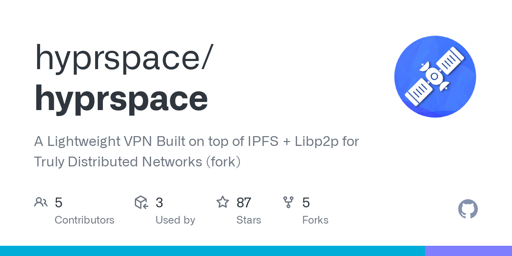I never could get Nix working but maybe someone will
Interesting, it’s on AUR, I will try it.
So it doesn’t need any port forwarding, and works on CGNAT? How the “NAT hole punching” works? Both clients connect to something on IPFS?
Afaik, for DHT with torrent, clients need to know at least one tracker, what is the “tracker” here? Something on IPFS? Who am I sending my IP addresses?
How much overhead does this add to speed? I love with Wireguard, that it’s barely noticeable, really close to p2p speeds, OpenVPN was awful in this regard.
First off great find. I didn’t think to check the AUR. I personally wouldn’t use it as that version is 3 years out of date but its existence means that it might be entirely possible to get a non Nix version. I’m not sure I fully understand why it needs Nix OS but what do I know.
It is all libp2p magic
There have been lots if talks on libp2p and Nat traversal. I suggest you check them out. How it actually works is pretty complex and requires someone more knowledgeable than me to explain. One way it works is that both devices start a TCP connection at the same time which gets the proper ports to open up.
This reminds me of nebula although nebula does require a central server to coordinate hosts.
What about Tailscale? I know it’s Proprietary software.
Tailscale is actually a lot more open than you think. The agents are all foss and there is a self hostable version.
*but relies on IPFS.
Useless.
Why is it useless?
Lol. You checked on IPFS lately? Different times. Different world.
Do you have more information? Haven’t looked into it for a while. What happened?
IPFS is like a dead Multiplayer game, or an Onion network. Check it out.
That which is asserted without evidence may be dismissed without evidence.
Didn’t realize we all were now incapable of looking out the window. That seems like something an absolutely incapable person would do because they’re way too lazy.
Is IPFS something your family and friends check on regularly? I don’t even know what it is.
Considering your reluctance to give any information about your assertion that such a project using it becomes useless, I’m not sure you know what it is either :P
I haven’t checked it out in years. From my understanding, IPFS aims to be a distributed filesystem that kinda works like Bittorent. If you access a file, you then seed it. Last time I checked it out, the project was jumping on the crypto bandwagon… Just checked out their website now, and don’t know WTF it is.
I sure wonder how this is supposed to function, any explanation anywhere, like a diagram or something?
It relies on libp2p not ipfs. ipfs uses libp2p as its transport
“A Lightweight VPN Built on top of IPFS + Libp2p”
Seems like both at a glance

Tell me what I’m misunderstanding here.
So I dug into the source code a bit to see how it’s used. It turns out that IPFS might actually optional, as per the log line on https://github.com/hyprspace/hyprspace/blob/master/p2p/node.go#L213 (“Getting additional peers from IPFS API”)
The list of required bootstrap peers is hardcoded in the same file, but a few lines above, specifically at https://github.com/hyprspace/hyprspace/blob/master/p2p/node.go#L181
I say might be because - while the required bootstrap peers include a bunch of ones based on bootstrap.libp2p.io - there is a long list of hardcoded ip addresses and I don’t recognize any of them.
So those might be libp2p.io ip addresses, but they might also be IPFS ip addresses, or even belong to someone else altogether. (Edit: There are WHOIS tools online like https://lookup.icann.org/en that can be used to look these up and figure out who they belong to if you are really curious, but I can’t be bothered to do that right now.)
In any case, it looks like the way this works is that from a peer, libp2p tries to look up additional peers, and so on. So at most IPFS would be used as a way to get a listing, but once the desired peer is found, IPFS is cut out of the picture for that particular connection and NAT hole punching is used to establish a direct connection between peers instead (as per the linked wikipedia article, https://en.wikipedia.org/wiki/Hole/punching/(networking )







